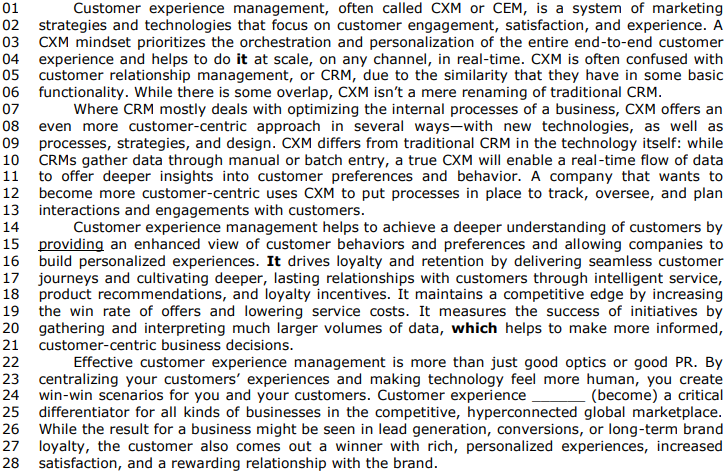Questões de Concurso
Comentadas sobre presente perfeito | present perfect em inglês
Foram encontradas 138 questões
Check the sentences below:
I- She’s been sleeping.
II- She’s being tested.
III- She’s just finished her meeting.
What is the ’s a contraction of in each sentence, RESPECTIVELY?
“Wonderful experience”: Researcher’s close encounter with Svalbard polar bears
By Miranda Bryant

(Available at: www.theguardian.com/environment/2024/apr/02/wonderful-experience-svalbardresearchers-close-encounter-with-svalbard-polar-bears – text especially adapted for this test).
I. This verb tense is used because the sentence states when the action started, but not when it finishes, once it is still ongoing. II. The verb “have” is used in the third person singular form to agree with the subject of the sentence. III. If the present perfect structure were substituted by a simple past structure, there would be no changes in meaning.
Which ones are correct?
"I ___ (implement) a new teaching strategy, and I ___ (notice) significant improvements in student engagement."
Julgue o item subsequente.
The sentence: "We have been to the beach last summer"
the sentence as a whole is in the present perfect tense.
Read the Text I and answer the five questions that follow it.
Text I
Correspondence
Human genome editing: potential seeds of conflict
Recently, The Lancet published an important declaration regarding the necessity of regulating and legislating for human genome editing. We agree with their opinions that the human genome editing technology and resulting research can have both positive and negative effects on human society. The use of genome editing for research and commercial purposes has sparked debates in both biological and political realms. However, most of them have mainly focused on the effects of human genome editing on the patients themselves, and little attention has been paid to their offspring.
Several films, such as Gattaca and Gundam SEED, have addressed the conflicts that arise from human genome editing. Such conflicts not only exist within the generation who have experienced editing but are also transmitted to their offspring. For example, in these films, the offspring of people without genome editing felt a sense of unfairness regarding the inferiority of their physical (or other non-edited domains) status, whereas the offspring of people with genome editing grew up in a biased, discriminated against, and ostracized environment. They could have lived in peace with a strong and well regulated government; however, when the tenuous grip of government weakens, jealousy and resentment can lead to ruins. Although these scenes still exist in films, they might become increasingly plausible in decades to come. Using the concept of preparedness, access, countermeasures, tools, and trust, we should prepare legitimate human genome editing, establish access to deal with imminent or potential discrimination, develop countermeasures and tools for prevention and resolution of conflict, and entrust future generations with the responsibility to use them wisely.
Bing-Yan Zeng, Ping-Tao Tseng, *Chih-Sung Liang
Adapted from: www.thelancet.com, vol. 401, June 24, 2023 athttps://www.thelancet.com/action/showPdf?pii=S0140-6736%2823%2901084-X
The main verb in “has sparked debates” is similar in meaning to
What is customer experience management?

(Available at: www.dynamics.microsoft.com/en-us/marketing/what-is-customer-experience-management-cxm/
– text specially adapted for this test).
Choose the alternative that contains a sentence that employs the present perfect:
Leia o trecho a seguir:
“____________ is a tense that expresses actions influenced by the present, that is, these actions are still happening or have been completed recently.”
Choose the alternative that correctly fills in the blank:
"I’ve had those two days to recharge my batteries".
The last period of the text is in the present perfect tense in which “been” is the past participle of the verb to be.
Concerning the Present Perfect, analyze the following items.
I. We use the present perfect to talk about situations continuing up to now.
II. We often use the present perfect for actions repeated up to now.
III. We do not use the present perfect when we say how long they have lasted.
The CORRECT item(s) is(are):
Judge the following item, related to the vocabulary and to the grammar in the precedent text.
In the second paragraph, the word “since” determines the use
of the present perfect continuous in “There have been
concerns”.